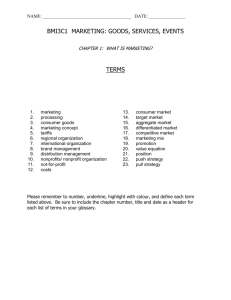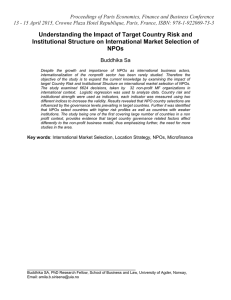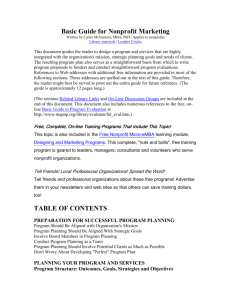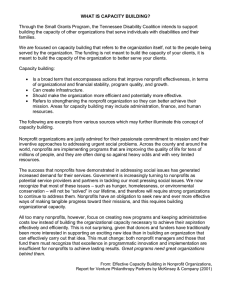Proceedings of World Business, Finance and Management Conference
advertisement
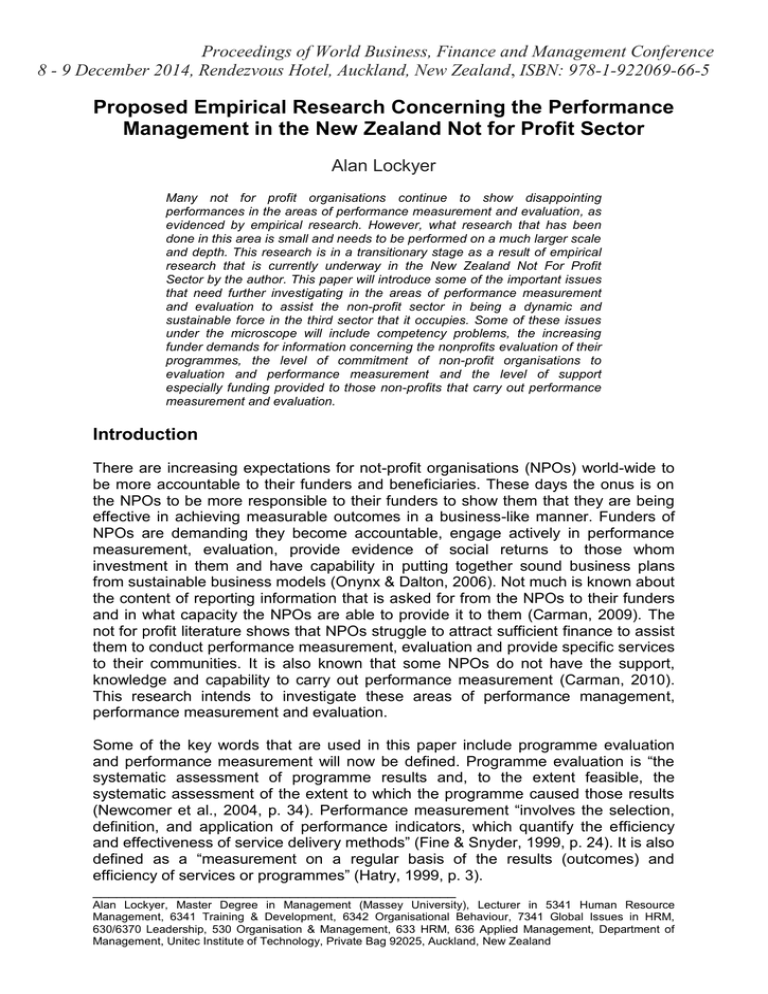
Proceedings of World Business, Finance and Management Conference 8 - 9 December 2014, Rendezvous Hotel, Auckland, New Zealand, ISBN: 978-1-922069-66-5 Proposed Empirical Research Concerning the Performance Management in the New Zealand Not for Profit Sector Alan Lockyer Many not for profit organisations continue to show disappointing performances in the areas of performance measurement and evaluation, as evidenced by empirical research. However, what research that has been done in this area is small and needs to be performed on a much larger scale and depth. This research is in a transitionary stage as a result of empirical research that is currently underway in the New Zealand Not For Profit Sector by the author. This paper will introduce some of the important issues that need further investigating in the areas of performance measurement and evaluation to assist the non-profit sector in being a dynamic and sustainable force in the third sector that it occupies. Some of these issues under the microscope will include competency problems, the increasing funder demands for information concerning the nonprofits evaluation of their programmes, the level of commitment of non-profit organisations to evaluation and performance measurement and the level of support especially funding provided to those non-profits that carry out performance measurement and evaluation. Introduction There are increasing expectations for not-profit organisations (NPOs) world-wide to be more accountable to their funders and beneficiaries. These days the onus is on the NPOs to be more responsible to their funders to show them that they are being effective in achieving measurable outcomes in a business-like manner. Funders of NPOs are demanding they become accountable, engage actively in performance measurement, evaluation, provide evidence of social returns to those whom investment in them and have capability in putting together sound business plans from sustainable business models (Onynx & Dalton, 2006). Not much is known about the content of reporting information that is asked for from the NPOs to their funders and in what capacity the NPOs are able to provide it to them (Carman, 2009). The not for profit literature shows that NPOs struggle to attract sufficient finance to assist them to conduct performance measurement, evaluation and provide specific services to their communities. It is also known that some NPOs do not have the support, knowledge and capability to carry out performance measurement (Carman, 2010). This research intends to investigate these areas of performance management, performance measurement and evaluation. Some of the key words that are used in this paper include programme evaluation and performance measurement will now be defined. Programme evaluation is “the systematic assessment of programme results and, to the extent feasible, the systematic assessment of the extent to which the programme caused those results (Newcomer et al., 2004, p. 34). Performance measurement “involves the selection, definition, and application of performance indicators, which quantify the efficiency and effectiveness of service delivery methods” (Fine & Snyder, 1999, p. 24). It is also defined as a “measurement on a regular basis of the results (outcomes) and efficiency of services or programmes” (Hatry, 1999, p. 3). ______________________________________________ Alan Lockyer, Master Degree in Management (Massey University), Lecturer in 5341 Human Resource Management, 6341 Training & Development, 6342 Organisational Behaviour, 7341 Global Issues in HRM, 630/6370 Leadership, 530 Organisation & Management, 633 HRM, 636 Applied Management, Department of Management, Unitec Institute of Technology, Private Bag 92025, Auckland, New Zealand Proceedings of World Business, Finance and Management Conference 8 - 9 December 2014, Rendezvous Hotel, Auckland, New Zealand, ISBN: 978-1-922069-66-5 Literature Review Evaluators Know Very Little About Nonprofits Response to Their Requests Although programme evaluation information is in demand, the evaluators know very little about how nonprofit organisations are responding to their demands. Henry and Mark (2003) claim that very little is known about how evaluation is being practiced, why it is being practiced, by whom and where it is being practiced, and to what effect. These researchers also claim that there is a serious lack of rigorous systematic evidence concerning evaluation practices performed by nonprofit organisations (Carman, 2007). These are extremely important issues and need further research in the New Zealand non-profit sector (NPS) at an in-depth level through a microscope lens. Research by Carman (2007) found that nonprofits are using disparate methods to collect the most elementary evaluation data, and their interpretations of what evaluation is differs from that expected from the evaluators. Other issues include nonprofits data collection and evaluation efforts are performed internally by programme staff who also provide services, and there is very little external support or funding for evaluation (Carman, 2007). Nonprofit sector has serious competency performance-based accountability problems The empirical research that has been performed in the NPS has shown that there are serious problems to address for the sector to achieve its funders requirements. Stewardship theory suggests that performance-based accountability systems assist to bring funders and service providers closer together to help them achieve mutual goals. However, it is well known that many NPO struggle with performance measurement, reporting they do not have time, resources, and expertise to conduct evaluation and measure required outcomes (Carman, 2007; Carman & Millesen, 2005; Hoefer, 2000); cited in Carman, 2010). Nonprofit organisations administrators have limited knowledge about programme evaluation. Community-based administrators have little training in evaluation. Apparently many programme administrators may have limited knowledge about programme evaluation practice, or may only have a working knowledge about the formal, traditional, and linear model of programme evaluation. Programme administrators may lack the skills for identifying and articulating a programmes theory; outlining the programmes goals; translating the goals into inputs, outputs, and outcomes; collecting data on programme participants; collecting data from a comparison group, analysing data; reporting on findings; making recommendations; and making programme-related decisions (McLaughlin & Jordan, 2004; Rossi & Freeman, 1993; cited by Carman, 2007). To add to this dilemma, Ebrahim (2003) found that NPOs downward accountability is so undeveloped it leaves the sector vulnerable to the funders as the main drivers for performance based accountability practices. An important issue Ebrahim states is if NPOs improved their own accountability this would result in less reliance of other organisations being responsible for accountability for those NPOs who are less accountable for themselves and whom lack the knowledge and resources. Proceedings of World Business, Finance and Management Conference 8 - 9 December 2014, Rendezvous Hotel, Auckland, New Zealand, ISBN: 978-1-922069-66-5 Small organisations monitoring tools cannot afford performance-based accountability Although large not-for-profit organisations may have some form of accountability monitoring tools, small organisations in this sector are compromised by the costs involved in developing such tools. An important issue Ebrahim (2003) states is if NPOs improved their own performance-based accountability this would result in less reliance of other organisations being responsible for accountability for those NPOs who are less accountable for themselves and whom lack the knowledge and resources. Demand for programme evaluation by funders is growing The on-going financial scandals occurring in the NPS have influenced calls for tighter accountability mechanisms to be used to monitor the NPOs use of public money (Young et al., 1996; Hoefer, 2000; Ebrahim, 2003; cited in Cribb, 2006). According to some authors (e.g.,Newcomer, Hatry, and Wholey (2004) the demand for programme evaluation is growing. Hence, government foundations, and other donors are requesting managers of NPOs for more information concerning evaluation and performance measurement of the public services they provide for a range of purposes. These purposes include the services the nonprofits provide, contract monitoring and reporting, organisational learning, and providing information about public policy and programme practices (Botcheva, White, & Huffman, 2002; Cutt & Murray, 2000; Ebrahim, 2005; Murphy-Graham & Birkeland, 2005; cited by Carman, 2007). The literature has grown in its reporting of the types of evaluation information expected by United Way, U. S. federal government agencies, and large foundations representing the NPS (OMB Watch, 1998; Poole, Davis, Reisman, & Nelson, 2001; Shannon, Clement, & Chase, 2000, United Way of America; W. K. Kellogg Foundation, n.d; cited in Carman, 2009). Confusion concerning level of support given to nonprofits by evaluators and funders It has been reported that nonprofits are becoming more involved in performing some type of evaluation and performance monitoring especially community based NPOs (Fine, Thayer, & Coghlan, 1998; Hoefer, 2000; Kopczynski & Pritchard, 2004; cited by Carman, 2007). However, the extent to which this is happening is not clear. Also, the evaluators and funders are improving the support they give to nonprofits by providing nonprofit programme managers with a wide range of evaluation tools and instruction manuals to assist them to respond to the evaluators and funders requests and mandates (Boulmetis & Dutwin, 2005; Braverman, Constantine, & Slater, 2004; Morley, Vinson, & Hatry, 2001; cited by Carman, 2007). However, this claim of support is argued by other researchers (e.g., Lyons, 2007; Carman, 2007). Lyons claims that many nonprofits receive inadequate support from the New Zealand government and these nonprofits need to rely on other sources of support especially from the private sector. Carman (2007) supports this view by claiming there is little external support or funding for the evaluation process. Content of nonprofit evaluation practices still unknown Murray (2005) believes that there is confusion regarding which evaluation practices are actually being performed. This is because most of the research concerning Proceedings of World Business, Finance and Management Conference 8 - 9 December 2014, Rendezvous Hotel, Auckland, New Zealand, ISBN: 978-1-922069-66-5 evaluation practices among community based nonprofits involves mainly case study research. Murray adds that there are many questions that need answering if the evaluation capacity of nonprofits can be improved to enable them to deliver quality services to the community they serve. The legitimacy of independency for some nonprofits questioned: Seeking different types of support from for-profit organisations Salamon (1999) questions the legitimacy of nonprofits in evidence of the increasing competition between for profits and nonprofits, and the fact that some nonprofits are becoming more commercialised (Carman, 2009). Some critics are questioning the nonprofits independency in light of their reliance on funding from public and private sources of funding (Stoecker, 1997; U. S. General Accounting Office, 1999; cited in Carman, 2009). Also, concerns about NPO efficiency has caused some NPO forming alliances with the private sector organisations to gain greater access to capital, greater capacity, and most importantly economies of scale (Ferris, 1993; Kettl, 1993; Osborne & Plastrick, 1998; Salamon, 2005; cited in Carman, 2010). This latter strategy could result in the merging of the NPO with the for-profit organisation. The merging of some NPO with for-profit organisation is apparently a frequent occurrence today. The nonprofit sector is underfunded Nonprofits are also expected to deliver more services than the contract payments cover (O’Brien, Sanders, & Tennant, 2009). This approach could lead to NPOs having to fund themselves from other sources to enable them to perform their accountability performance measurements. According to some researchers (e.g. Bamberger, Rugh, Church,& Fort, 2004; Council of Foundations, 2002), in the United States many evaluation and performance measurement efforts are designed using minute budgets because many funders have a preference for programme support over operating support (Carman, 2010). This is a potential problem for the funded NPO because they might not have the funds to implement the accountability programme themselves and hence back away from their expected accountabilities and responsibilities. Nonprofit managers lack commitment to evaluation and performance measurement practices Nonprofit managers often question the importance of performance measurement and the value of investing a lot of time and energy into gathering data and compiling reports for multiple funders with different expectations. David (2006) adds that nonprofit managers are reluctant to complain about these issues in fear of not being funded in the future (Carman, 2010). Carman and Fredericks (2008) and Mott (2006) add to the argument when they claim that, “In some situations, performance- based accountability requirements have actually driven a wedge between funders and nonprofits, with some nonprofits viewing these requirements as a resource drain and a distraction (Cited in Carman, 2010, p. 259). In response to this argument what needs to be asked is what is left Proceedings of World Business, Finance and Management Conference 8 - 9 December 2014, Rendezvous Hotel, Auckland, New Zealand, ISBN: 978-1-922069-66-5 over for the delivery of social services in the NPOs coffers once they have taken out the costs of implementing their performance measurement and evaluation systems? Methodology The sample selection will be not for profit CEOs because they are expected to have knowledge of performance measurement, evaluation and social progammes in their organisation. The CEOs won’t be chosen randomly but by invitation where they either accept or don’t accept to take part in the research. Hence, it is their choice whether they take part in the research or not. They will be drawn from a NPO database of 3,500 CEOs from the Not For Profit Sector. The sample size will depend on the willingness of the CEO NPOs to participate in the research. However, a sample size of at least 200 participants is expected. Research design The questionnaire to be used in this research, apart from some changes made to it, was previously used by US academics for the same purpose and tested in the not for profit arena. This is a replicate study but some minimal changes will be made from the original questionnaire mentioned above in the areas of NPO sources of funding to meet the New Zealand situation and adding a question in regards to providing evidence of positive impacts of NPO activities on communities. Both qualitative and quantitative data will be collected by using the questionnaire and this data will be entered into a SPPS programme for analysis and interpretation. Discussion and Conclusion It is essential that New Zealand has an efficient and effective Not For Profit Sector that enables it to contribute to the sustainability and growth of communities they serve to make a positive difference. However, the Not For Profit Sector has many challenges that it needs to face on a day to day basis. The secondary research performed in this paper has pointed out many of these challenges that need to be addressed. Evaluators know very little about nonprofits response to their requests where one of the main issues here is what systems are in place for NPOs to perform performance evaluation effectively. Nonprofit sector staff have serious competency gaps regarding performance measurement that include a lack of expertise and knowledge of programme evaluation. Small organisations cannot afford accountability monitoring tools. Nonprofit organisations need to be made accountable for their programme evaluation and if they perform this admirably then there would be less need for them to be audited and controlled by government evaluation regulators. However, small NPOs lack the numbers, finance and expertise to fulfil their regulators needs. The demand for programme evaluation by funders is growing and this has been further evidenced by worldwide pilfering and wasting of its scarce resources in the nonprofit sector, especially, the funders proceeds with continuing questions being asked to NPOs concerning how efficiently and effectively has this finance has been spent? Has the spending made a positive difference to societal needs and wellbeing? This further pushes the reasons why evaluation and performance measurement needs to be conducted in this sector. There is confusion due to argument concerning the level and type of support given to nonprofits by evaluators and funders. Evaluation tools and instruction manuals are being given to NPOs according to some sources whereas other critics say that this is not happening or is very limited and needs to be supported by private organisations. Proceedings of World Business, Finance and Management Conference 8 - 9 December 2014, Rendezvous Hotel, Auckland, New Zealand, ISBN: 978-1-922069-66-5 The content of nonprofit evaluation practices is still unknown and this is because much of the research performed in performance measurement and evaluation practices is miniscule since it has been mainly sourced from small case studies. These small case studies do not enable large numbers of participants to be researched and this affects the validity of the reported results. The legitimacy involving the independency of NPOs has been questioned. This has raised issues including the sustainability of the NPS and its ability to attract or raise finance to enable it to survive. Such finance is needed for its paid staff, performing performance measurement and evaluation practices and the delivery of its services using efficient means. However, the NPS is dependent on government funding (e.g., grants) and the general public and private donations to enable it to do these things. Nonprofit managers have been accused of showing a lack of commitment to evaluation and performance measurement practices and this has serious consequences. This has been shown to be the case for some NPOs who claim that evaluation and performance measurement practices take away the focus of what the NPO purpose actually is. If multiple funders are involved in the relationship this further adds confusion to their relationship due to the differing requirements expected from each funder. Further Research Further research concerning this vitally important topic and sector needs to consider many of the important issues raised in this paper. Which activity groups are performing performance measurement and evaluation practices in the New Zealand NPS? At what capacity are performance measurement and evaluation practices being performed? What types of support is being provided to NPO who perform performance measurement and evaluation practices? Are they being provided with the necessary inputs of time, resources (e.g., knowledge, skills, and capabilities) and expertise? How are New Zealand small NPOs coping with costs involved in performance measurement and evaluation practices? What are they performing regarding performance measurement and evaluation practices? How closely do they fit the needs of their principal fund providers and the needs of the community? The content of nonprofit evaluation practices is still unknown, hence has the increasing demand from principal funders for information about programme evaluation been interpreted as meaningful evaluation efforts for the NPO? The nonprofit sector is underfunded hence I want to further research what typical services do NPOs not deliver if contract payments are insufficient to deliver them? What other sources of funding do they acquire to perform their accountability responsibilities and service delivery to their customers? The literature suggests that some nonprofit managers lack commitment to evaluation and performance measurement practices. In response to this claim I want to find out the level of commitment of NPOs to performing accountability practices. Do they do it because they have to, or do they do it because it helps them achieve their mission, or is it both of these things? Or looking at things from another angle, what are the reasons why they do not perform or lack a commitment to evaluation and performance measurement practices? Proceedings of World Business, Finance and Management Conference 8 - 9 December 2014, Rendezvous Hotel, Auckland, New Zealand, ISBN: 978-1-922069-66-5 References Carman, J. G. (2007). Evaluation practice among community-based organisations: Research into the reality. American Journal of Evaluation, 28(1), 60-75. Carman, J. G. (2009). Nonprofits, funders and evaluation: Accountability in action. American Review of Public Administration, 39, 374-390 Carman, J. G. (2010). The accountability movement: What’s wrong with this theory of change? Nonprofit and Voluntary Sector Quarterly, 39(2), 256-274. Cribb, J. (2006). Paying the piper? Voluntary organisations, accountability and government contracting. Third Sector Review, 12(1), 25-37. Ebrahim, A. (2003). Making sense of accountability: Conceptual perspectives for Northern and Southern nonprofits. Nonprofit Management and Leadership, 14, 191212. Fine, T., & Snyder, L. (1999). What is the difference between performance and benchmarking? Public Management, 81(1), 24-25. Hatry, H. P. (1999). Performance measurement: Getting results. Washington, DC: Urban Institute Press. Henry, G. T., & Mark, M. M. (2003). Toward an agenda for research on evaluation. In C. A. Christie, (Ed.). The practice theory relationship in evaluation: New directions for evaluation (Vol. 97, pp. 69-80). San Francisco: Jossey-Bass. Lyons, M. (2007). Third sector opportunities and challenges: A four-sector analysis. Third Sector Review, 13(2), 9-26. Murray, V. (2005). Evaluating the effectiveness of nonprofit organizations. In R. D. Herman & Associates (Eds.), The Jossey-Bass handbook of nonprofit leadership and management (2nd ed., pp. 345-370). San Francisco: Jossey-Bass. Newcomer, K. E., Hatry, H. P., & Wholey, J. S. (2004). Meeting the need for practical evaluation approaches. In J. S. Wholey. H. P. Hatry, & K. E. Newcomer (Eds.), Handbook of practical program evaluation (2nd ed., pp. xxxiii-xliv). San Francisco: Jossey-Bass. O’Brien, M., Sanders, J., & Tennant, M. (2009, August). The New Zealand non-profit sector and government policy. Working Paper of the John Hopkins Comparative Nonprofit Sector Project Onyx, J. and Dalton, B. (2006) Accountability and Advocacy. Third Sector Review, 12 (1): 7-24. Salamon, L. A. (1999). America’s nonprofit sector: A primer (2nd ed.). New York: The Foundation Center.
